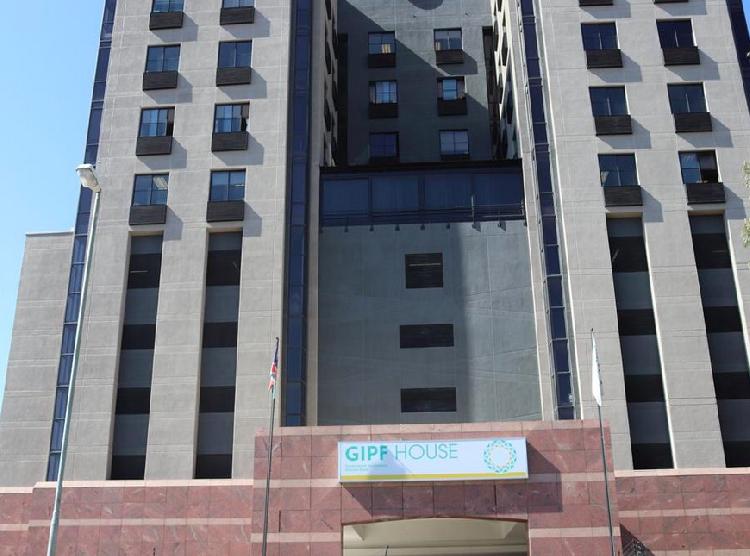Africa-Press – Namibia. EXECUTIVE officials of the Government Institutions Pension Fund (GIPF) have expressed satisfaction with the performance of some of its unlisted investment companies in the Erongo region.
The company’s board of trustees and executive leadership on Thursday visited two such companies based at Walvis Bay, namely Etosha Fishing, which specialises in pilchard canning, and WinSalt, which manufactures lick salts for the agriculture industry.
The GIPF has over 16 unlisted investments in the Erongo region valued at N$550 million in building supplies, manufacturing, water engineering, medical services, engineering, property development, land servicing, retail shopping, renewable energy, housing, and warehousing.
The GIPF invested over N$27 million in Etosha Fishing Corporation in the early 1990s, and has a 30,1% shareholding stake in the company.
GIPF chief executive officer (CEO) David Nuyoma says the pension fund has recouped its initial investment in the factory a few years ago, and has since been receiving dividends.
This is despite the company experiencing challenges, which have led to its near collapse in recent years.
“Etosha has come a long way. It has gone through product development cycles. There were times that we thought the light will dim completely – especially when the quota for pilchard was suspended due to overfishing or due to climatic change. But from time to time is has been able to pay dividends,” Nuyoma says.
The moratorium on pilchard remains one of the greatest risks Etosha Fishing is faced with. To keep operations going, the company has been importing frozen pilchard from Morocco.
Nillian Mulemi, the GIPF board’s chairperson, is hopeful that the Ministry of Fisheries and Marine Resources will lift the moratorium this year after considering a stock survey last October.
“We hope it will be lifted. If it is lifted, we are going to fish in our water rather than import. What this [imports] did is jobs were maintained, the infrastructure is still there. But it also introduced innovation because we need to continue operating,” Mulemi says.
With limited pilchard in the market, Etosha Fishing has introduced the canning of horse mackerel.
This, according to Mulemi, is not set to take place soon.
She says the GIPF has selected the unlisted companies due to the immediate impact they can have on communities and the country.
“The reason why we selected a few impact projects to invest in is because we want to invest in what is called real economy. There is a direct benefit to all sectors of the economy through employment. There is a lot of research that goes into domesticating some of the services we offer as a country,” Mulemi says.
Months before Covid-19 hit, the GIPF also invested N$7million in the now-expanding salt company WinSalt at Walvis Bay.
The company manufactures animal mineral salt-lick blocks as well as water-softening blocks and tablets for both industrial and home use.
“The GIPF saw an opportunity in the agricultural industry through animal feed and nutrition blocks and decided to spearhead investments towards the manufacturing thereof for all livestock,” Nuyoma says.
The company started off with a staff complement of eight employees, and strives to increase this number to 25.
Craig Deyzel, the CEO of WinSalt, says the company has expanded its markets to Asia.
“We are loading our first four containers that are going to South Korea, which is the furthest export we have ever done,” he says.
The salt licks are registered and approved in South Africa, which is the biggest market, with more exported to African markets such as Uganda and Tanzania, Angola, Botswana, and Zambia, and developed countries such as Australia, Spain, and Portugal.
Five percent of the pension fund’s investment is in unlisted companies.
For More News And Analysis About Namibia Follow Africa-Press






